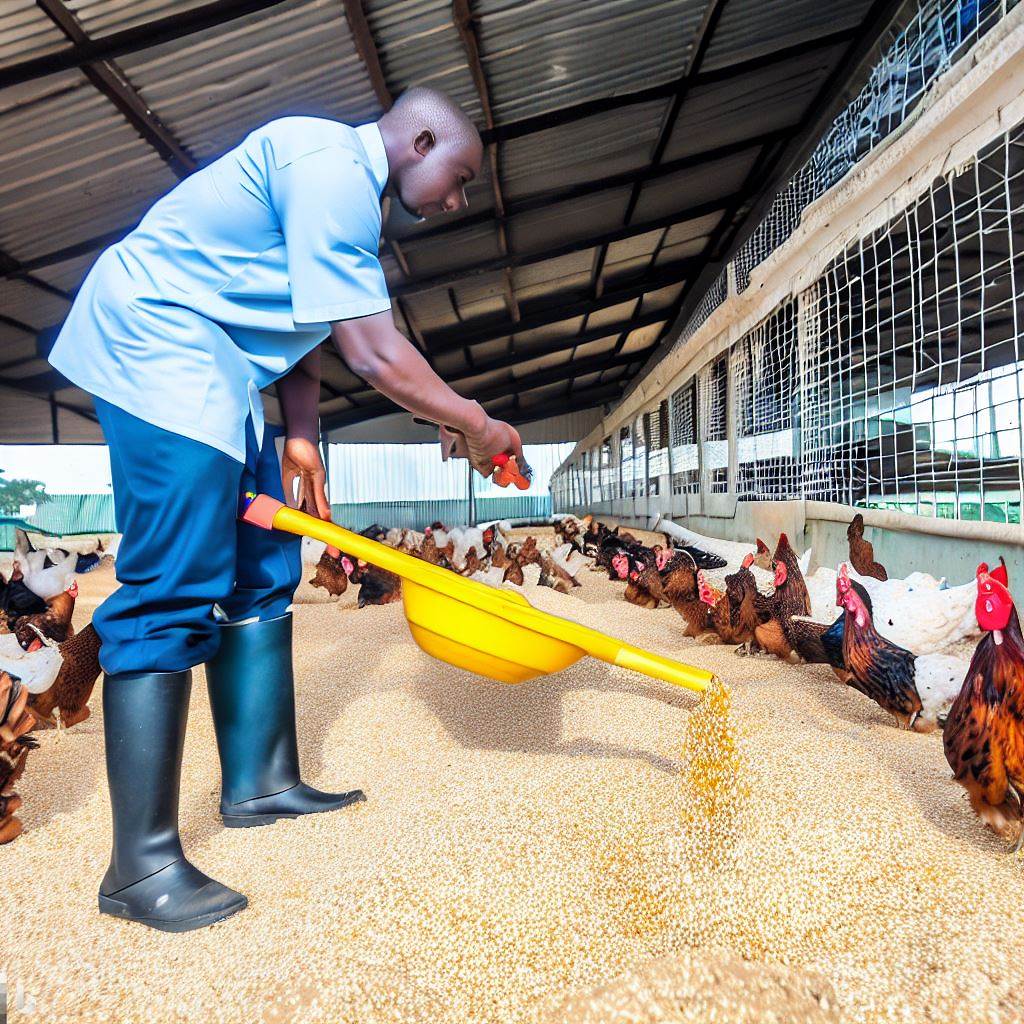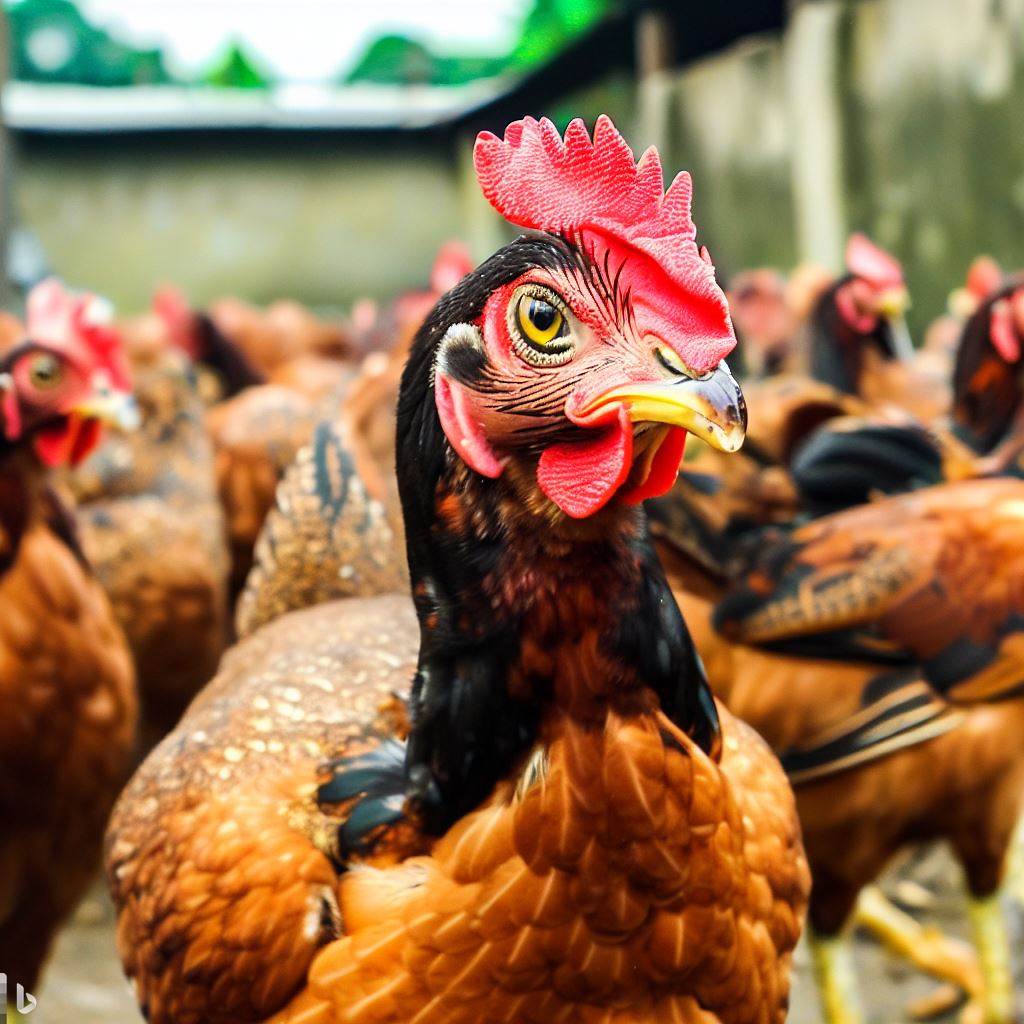Introduction
Effective feed management is pivotal for prosperous poultry production, ensuring optimal growth and productivity.
Nigeria’s poultry sector stands as a vital contributor to the nation’s economy and food security.
This blog post aims to offer a holistic grasp of feed management in Nigerian poultry production.
In this context, proficient feed management is indispensable for the flourishing of poultry farming.
Nigeria’s poultry industry holds substantial significance in bolstering the country’s economic landscape and ensuring food self-sufficiency.
The focal intent of this blog post is to impart a comprehensive comprehension of feed management within the context of poultry production in Nigeria.
Importance of Feed Management in Poultry Production
- Nutrition Foundation: Proper feeding maximizes growth, egg production, and overall bird health.
- Cost Efficiency: Efficient feed utilization reduces expenses and improves profit margins.
- Disease Prevention: Balanced diets boost immunity, minimizing the risk of diseases in poultry flocks.
Overview of Poultry Production in Nigeria
- Thriving Industry: Poultry farming is a vital component of Nigeria’s agriculture sector.
- Economic Impact: It provides employment and contributes significantly to food security and economic growth.
Brief Explanation of the Purpose of the Blog Post
This blog post aims to provide valuable insights into the significance of effective feed management in poultry production.
By understanding the role of nutrition in poultry farming, Nigerian farmers can enhance their practices, increase productivity, and contribute to the growth of the poultry industry.
Understanding Feed Management
Definition and significance of feed management
Feed management refers to the process of providing the correct nutrition to poultry for optimal growth and productivity.
It is crucial for successful poultry production as it directly affects their health, performance, and profitability.
Different types of poultry feeds available in Nigeria
In Nigeria, poultry farmers have access to various types of feeds, including starter feeds, grower feeds, layer feeds, and finisher feeds.
These feeds are formulated to meet the specific nutritional needs of each stage of poultry development.
Key factors to consider for effective feed management
1. Nutritional requirements of poultry
Poultry requires a balanced diet that includes proteins, carbohydrates, fats, vitamins, minerals, and water to support its growth and overall health.
2. Age and breed-specific feed considerations
Different poultry species and ages have varying nutritional needs. Properly formulated feeds should be provided based on these requirements to ensure optimal development.
3. Feeding schedule and portion control
Establishing a regular feeding schedule and controlling the portion size is essential to prevent underfeeding or overfeeding, which can lead to health issues and inefficient growth.
4. Water accessibility and quality
Adequate water availability and clean drinking water are crucial for proper digestion, nutrient absorption, and overall hydration of the birds.
5. Quality assurance and feed storage:
Poultry feeds should be stored in a clean and dry environment to maintain their quality.
Regular monitoring and testing should be done to ensure feed quality and prevent contamination.
Proper feed management is a critical aspect of poultry production in Nigeria.
By understanding the nutritional requirements, considering breed and age-specific needs, establishing a feeding schedule, ensuring water accessibility and quality, and maintaining feed storage conditions, poultry farmers can maximize their production potential and achieve profitable results.
Read: Impact of Government Policies on Poultry Production in Nigeria
Implementing Feed Management Practices
Achieving successful poultry production in Nigeria requires effective feed management practices. These practices include:
Evaluating the nutritional content of poultry feeds
To ensure optimal growth and health, it is crucial to evaluate the nutritional content of poultry feeds.
This involves analyzing the quality and quantity of essential nutrients such as proteins, vitamins, minerals, and carbohydrates.
Balancing rations and formulating feed
Once the nutritional content is assessed, it is necessary to balance rations and formulate feed with the right proportions of each nutrient.
This ensures that the birds receive a well-rounded and balanced diet.
Assessing feed quality and sourcing trusted suppliers
Feed quality plays a significant role in poultry production. It is essential to assess the quality of the feed and ensure that it meets the necessary standards.
Sourcing feed from trusted suppliers is also vital to guarantee consistent and high-quality feed supply.
Designing efficient feeding programs for optimal growth and health
Designing efficient feeding programs is crucial for maximizing growth and maintaining the overall health of the poultry.
These programs should include the appropriate feeding schedule, frequency, and quantity to meet the nutritional requirements of the birds at different developmental stages.
Preventing feed wastage and monitoring for feed-related issues
Feed wastage can have a significant impact on production costs and profitability. Implementing strategies to prevent wastage, such as using appropriate feeders and ensuring proper storage, can help minimize losses.
Additionally, continuously monitoring for feed-related issues, such as contamination or spoilage, is essential to maintain the health and well-being of the birds.
By implementing these feed management practices, poultry farmers in Nigeria can enhance their production efficiency, improve bird health, and ultimately achieve greater success in their operations.
Read: Emerging Trends in the Nigerian Poultry Production Sector
Challenges and Solutions in Feed Management
Common challenges faced by poultry producers in Nigeria
- High cost of quality feed
- Availability and consistency of feed supply
- Contamination and adulteration of feed ingredients
Solutions and strategies to overcome feed management challenges
- Establishing local feed production units
- Collaboration with trusted suppliers and organizations
- Implementing quality control measures and regular testing
Feed management poses significant hurdles for Nigerian poultry production.
One pressing challenge is the steep cost of quality feed, constraining profitability and growth.
Additionally, maintaining a consistent feed supply is problematic, impacting bird nourishment and growth.
Contamination and adulteration of feed compounds are these issues, jeopardizing poultry health and output.
To conquer these obstacles, local feed production units offer a solution by granting control over feed quality and costs, reducing reliance on costly imports.
Collaborating with reputable suppliers and organizations ensures a stable supply of quality feed and access to valuable guidance.
Implementing rigorous quality control measures and frequent testing is vital to detecting and addressing contamination and adulteration promptly.
In summary, Nigerian poultry producers can surmount feed management challenges.
By embracing local production, forging partnerships, and enforcing quality control, the industry can enhance productivity and profitability while ensuring healthier poultry outcomes.
Read: The Economics of Poultry Production in Nigeria

Uncover the Details: Nigeria’s Dairy Industry: Exciting Career Prospects
Benefits of Effective Feed Management
A well-managed feed system is crucial for successful poultry production in Nigeria.
In addition to meeting the nutritional needs of the birds, effective feed management offers several important benefits:
Improved Flock Health and Production Performance
- Proper feed management ensures that poultry receive the necessary nutrients for optimal health and growth.
- Well-balanced diets contribute to improved immunity, reducing the incidence of diseases and mortality.
- Quality feed promotes better feed conversion, resulting in higher weight gain and improved production efficiency.
Cost-effective Operations and Maximizing Profitability
- Efficient feed management reduces wastage, minimizing feed costs and maximizing profitability.
- Optimizing feed utilization helps to achieve the desired growth rate in a shorter period, reducing production costs.
- Preventing feed spoilage and contamination ensures maximum utilization of feed resources.
- Detailed management of feed inventory helps prevent overstocking or stock shortfall, avoiding unnecessary expenses.
Sustainable Poultry Farming and Reduced Environmental Impact
- Effective feed management strategies minimize environmental pollution by reducing nutrient wastage and microbial contamination.
- Proper feed handling and storage prevent feed spillage and minimize pollution of soil and water resources.
- Efficient feed utilization reduces the demand for raw materials, supporting sustainable farming practices.
- Conservation of resources through optimal feed management helps protect the natural environment.
Enhanced Product Quality and Customer Satisfaction
- Well-managed feed systems ensure the production of healthy and high-quality poultry products.
- Balanced nutrition contributes to the development of robust and flavorful meat and eggs.
- High-quality feed results in enhanced product taste, appearance, and nutritive value, satisfying customer preferences.
- Consistent feed supply ensures a steady production of quality products, maintaining customer satisfaction and loyalty.
The benefits of effective feed management cannot be overstated.
By prioritizing the nutritional needs of poultry, farmers can improve flock health, reduce costs, and minimize environmental impact while producing high-quality products that meet customer expectations.
Read: Guide to Starting a Poultry Farm in Nigeria: Steps & Tips
You Might Also Like: Career Growth Prospects for Animal Geneticists in Nigeria
Conclusion
A recap of the importance of feed management in poultry production
Feed management plays a crucial role in ensuring successful poultry production in Nigeria.
It directly influences the growth, health, and overall performance of birds.
Key takeaways for successful feed management in Nigeria
Proper nutrition, feed quality, regular monitoring, and appropriate feed formulation are key factors for successful feed management in poultry production.
Encouragement for poultry producers to prioritize feed management practices
Poultry producers should prioritize feed management practices to optimize bird performance, reduce production costs, improve profitability, and contribute to the overall growth of the industry.




